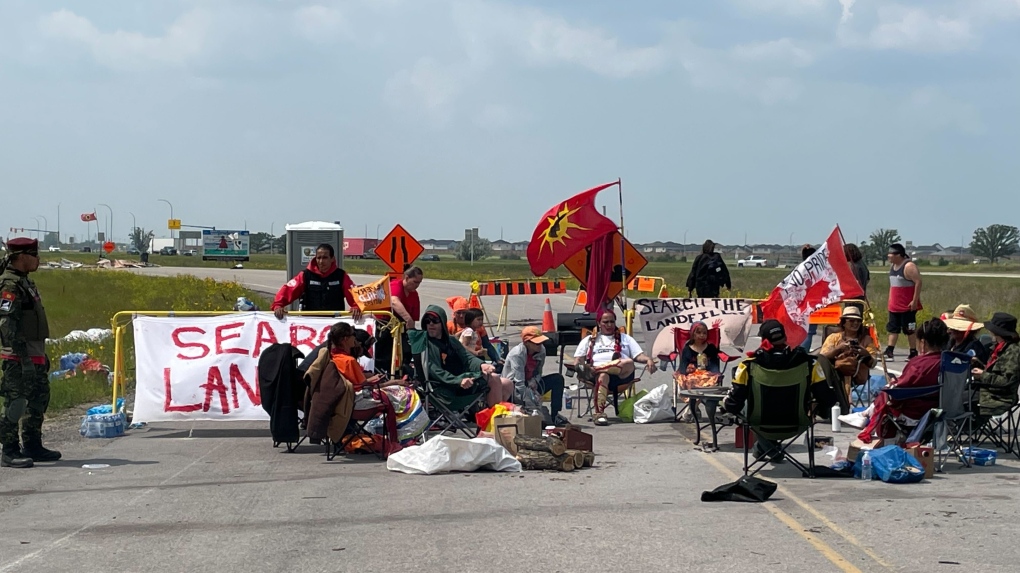'It can be done safely': Experts say method for landfill search has been successful in the past
A panel of forensic experts brought together by Manitoba's Indigenous leaders say a search of a landfill near Winnipeg for the remains of two Indigenous women can be done safely.
It's been more than two months since the results of an Indigenous-led feasibility study were made public, saying a search of the Prairie Green Landfill for the remains of Morgan Harris and Marcedes Myran is feasible. The study says a search could take up to three years and cost approximately $184 million. While it warns there are risks due to exposure to toxic chemicals, it says forgoing a search could be harmful to the families of the victims.
In the months since the study's release, families have been waiting for a commitment from all levels of government to get a search started.
"There are always these excuses that you hear from the provincial government about health and safety risks, and that is why we are here today," said Chief Kyra Wilson of Long Plain First Nations. "It can be done, it should be done, and it needs to be done."
This comes after Manitoba Premier Heather Stefanson said her government won't support the landfill search, saying the province won't knowingly risk the health and safety of Manitoba workers without a guarantee.
In response to the comments, on Monday the Assembly of Manitoba Chiefs brought together a panel of experts who had helped with the creation of the feasibility study.
Emily Holland, a forensic anthropologist, said the proposed method of searching Prairie Green Landfill for the remains of Morgan Harris and Marcedes Myran would be focused on one area of the landfill. The material would move through a conveyer belt system with trained individuals on either side looking for any possible evidence of the two women.
She said the method is based on two past successful landfill searches.
Mounties in B.C. successfully searched and recovered remains of several women in Robert Pickton's pig farm in British Columbia in the early 2000s. The second search in the early 2010s saw police in Sault Saint Marie, Ont. excavate a landfill south of the border where remains of a local homicide victim had been discarded.
"That was a successful search. We were able to find the remains of the victim in that case and return them to his loved ones," said Sean Sparling, the CEO of ISN Maskwa who was involved in that search.
"The same process that was used in Sault Saint Marie, Ontario is the same process we would use or that can be used in Winnipeg. It can be done safely."
The feasibility study does highlight that there is no guarantee the remains of the two women will be recovered. Grand Chief Cathy Merrick says the community understands this.
"We know there is no guarantees, but an effort for humanitarian purposes alone needs to be done. For closure, for peace of mind, we need to make that effort," she said.
"Governments cannot allow them to just be added to the staggering statistics of MMIWG and the crisis in this country. They are not garbage, yet they are being treated like garbage, left in a landfill site, no proper burial, no closure for the family."
A spokesperson for Premier Heather Stefanson's office told CTV News that leadership requires difficult decisions.
"There is no guarantee of finding remains, and immediate and long-term health and safety risks are real and cannot be ignored. We must preserve the integrity of the justice proceedings," a written statement reads.
Must Watch
Top Videos
CTVNews.ca Top Stories

Calgary woman stranded in Mexico after husband's death during diving trip
A Calgary woman is struggling to return home after her husband died while diving in Mexico, leaving her stranded and facing financial hardship.
Fugitive U.S. rioter seeks asylum in Whistler amid warnings of more to come
An American citizen convicted of participating in the Jan. 6, 2021, riot on Capitol Hill and dodging jail time in Whistler may just be the start of an asylum-seeking rush, according to a prominent legal expert.
Special national Liberal caucus meeting called for next week after regional chairs meet: sources
A special meeting of Prime Minister Justin Trudeau's national Liberal caucus has been called for next Wednesday, sources say.
N.S. community shocked by deaths of father, daughter; suspect was wanted in Toronto shooting
A Nova Scotia community is mourning the loss of two of its members after they were shot and killed in Halifax on New Year's Eve.
Canada pausing applications for parent, grandparent permanent residency sponsorships
Canada will not accept new parent and grandparent permanent residency sponsorship applications until further notice, according to a ministerial directive.
Soldier who blew up Tesla at Trump hotel left note saying blast was to be a 'wakeup call' for the U.S.
A highly decorated Army soldier who fatally shot himself in a Tesla Cybertruck just before it blew up outside the Trump hotel in Las Vegas left notes saying the New Year's Day explosion was a stunt to serve as a “wakeup call” for the country’s ills, investigators said Friday.
Sea and Himalayan salts recalled in Canada: 'Do not use, serve or distribute'
Two brands of sea and Himalayan salt are being recalled in Canada due to pieces of plastic found in the products.
'Inadmissible' foreign nationals to pay more upon return to Canada: CBSA
Foreign nationals who refuse or are unable to pay their own way home after being denied stay in Canada will soon face steeper financial penalties should they ever attempt to return.
'It's about time': Experts in Canada support call for warnings about cancer risk from alcohol
While Canada hasn't mandated cancer warnings for alcoholic beverages, a few experts are supporting a new push in the U.S. to have the labels on the products.



























































